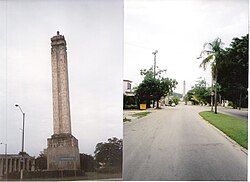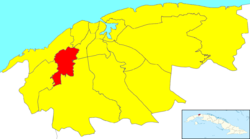Marianao | |
|---|---|
 "El Obelisco", Carlos J. Finlay Memorial | |
 Location of Marianao in Havana | |
| Coordinates: 23°05′0″N82°26′0″W / 23.08333°N 82.43333°W | |
| Country | |
| Province | |
| Wards (Consejos Populares) | CAI-Los Ángeles, Libertad, Pocito-Palmas, Pogoloti-Belén-Finlay, Santa Felicia, Zamora-Cocosolo |
| Area | |
• Total | 22 km2 (8.5 sq mi) |
| Population (2022) | |
• Total | 134,057 |
| • Density | 6,100/km2 (16,000/sq mi) |
| Time zone | UTC-5 (EST) |
| Area code | +53-7 |
Marianao is one of the 15 municipalities or boroughs ( municipios in Spanish) in the city of Havana, Cuba. It lies 10 kilometres southwest of the original city of Havana, with which it is connected by the Marianao railway. In 2022 the municipality had a population of 134,057. [2] Marianao is on a range of hills of about 1500 above sea level and is noted for its salubrious climate. [3] The city dates back to 1830.